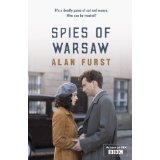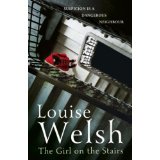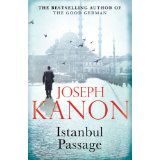The Best Fiction from the Second Half of 2012
Posted: February 10th, 2013 | No Comments »Before we get too far into 2013, and following on from my half-year round up, here’s what I thought worth reading fiction-wise in the second half of 2012:
Mission to Paris – Alan Furst – As ever Mr Furst is firing on all cylinders with his evocation of pre-WW2 Paris and a visiting Hollywood film star caught up in espionage. For my money Furst remains the preeminent spy writer with his always excellent evocation of pre-war Europe.
Toby’s Room – Pat Barker – Barker continues to milk the Great War generation. This one continues again themes she’s explored before – what the trenches did to that great and talented pre-war generation, the role of the Slade Art School in particular and here also weaving in the true story of the Slade students who sketched the horrific injuries that resulted from the conflict. Familiar ground and well trod but always readable.
Sweet Tooth – Ian McEwan – I’m hit and miss on McEwan – loved Atonement and others though Saturday remains for me the worst novel of recent years for its moronic depiction of working class Londoners. Still, here McEwan is on better ground with a back and forth spy story set in the 1970s – the recruitment scenes are by far the strongest.
The Girl on the Stairs – Louise Welsh – I’m a fan of Welsh, she is a master of the set scene as she showed in previous novels (see her antique traders in a Glasgow pub scene in Naming the Bones as a masterclass). Here she returns to Berlin, a city she’s written about before (all the grit of her native Glasgow but with a little more mysteriousness) for a tale that sees a British ex-pat caught up in Berlin’s past.
Dare Me – Megan Abott – I loved Abbott’s noir style books (and hope she does more) and The End of Everything. I then got to meet her and be on a panel with her in Adelaide this year and we got on like a house on fire. But I wasn’t overly convinced I’d like Dare Me – the tale of the shady and sordid goings on in a suburban American High School girls cheerleader team – a wee bit out of my scope of cultural references that! However, Abbott’s writing is so toght and great she carries you along and it’s another great book – about time Ms. Abbott won some awards I me thinks!
The Shameful Suicide of Winston Churchill – Peter Millar – a cracking, one sitting of a read. Counterfactual history with Churchill disgraced, London conquered by the Russians after WW2 and now a divided country (everything north of Bedford is sort of West Germany, everything south like the GDR) and London is divided into a West and East with those in the East stuck in a North Korean (and, naturally as this is London, Orwellian) state. But worms turn – very enjoyable.
Istanbul Passage – Joseph Kanon – Kanon is a massively popular writer but new to me. His just post-war Istanbul here is reminiscent of the Eric Ambler’s in his classic Journey into Fear. Spy goings-on allow for descriptive passages of the great city, the new Cold War mentality and one man’s largely accidental role in it.
NW – Zadie Smith – I inwardly groaned when I heard Smith’s new book was more North West London nostalgia, but it has to be admitted she does pull it off. She captures the character types and rhythms of the area brilliantly and interweaves the stories of a disparate group of inhabitants. Anyone who thought too much gadding about in New York has blunted Smith should read this.
The Harbour – Francesca Brill – the story of Emily Hahn and Charles Boxer retold in novel form. I wrote a slightly longer review of this and the problems with the Boxer as collaborator trope here.
Before the Poison – Peter Robinson – The creator of the Inspector Banks series (which I always note in my review of the pulps) writes a different sort of story. I haven’t much liked Robinson’s non-Banks work previously but this is a good story looking back on a woman’s mysterious life and with a little Singapore internment thrown in for good measure – hence a slightly longer review here.
The Melrose novels – Edward St Aubyn – it took me a while to get around to reading these books as I thought they’d be too much about posh people. They are, but they’re brilliantly written – Never Mind, Bad News and Some Hope. Patrick Melrose is at once witty and idiotic, stupid and clever, lovable and horrible.



Leave a Reply